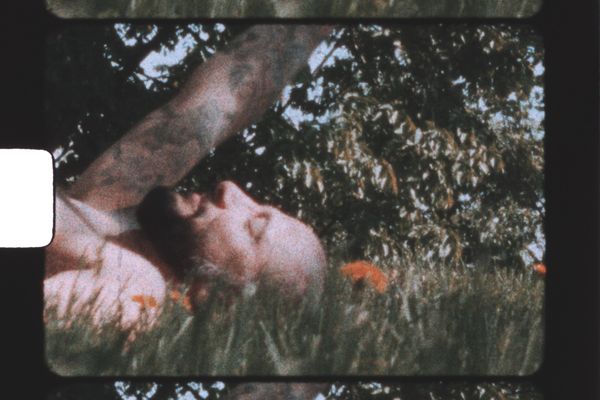
Email us to revise your entry or request it to be deleted.
Colour
16mm
super-8
digital
Want to add a content warning? Email us!
Paternal Rites is a first-person essay film that examines the secret underbelly of a contemporary Jewish American family as they grapple with the aftereffects of physical and sexual abuse on their present-day lives. It is also a groundbreaking film about the nature of trauma and memory itself: the ways in which trauma encrypts in uncanny ways; the function of speech and narrative in the process of decryption; and the role of film and filmmaking in the practice of healing. Paternal Rites draws inspiration from podcasts like This American Life and Radiolab and the long lineage of LGBT essay filmmakers in the U.S. such as Jenni Olson, Marlon Riggs, and Richard Fung. Functioning as the film’s primary conceit, in the fall of 2013 filmmaker Jules Rosskam and his partner, Alex, set out to retrace a road trip that Rosskam’s parents, Marilyn and Skip, completed in the fall of 1974—just prior to his birth and their transition to suburbia and parenthood. The viewer hears audio diaries that Marilyn and Skip kept during the course of their four-month journey and sees photographs and travelogue footage recorded on Super 8: barely perceptible, grainy, and quickly receding signs and landmarks carry the viewer along their route: Boston, Mobile, Savannah, Chicago, Portland, Vancouver. Interspliced between, we hear present-day audio interviews between Rosskam and a chorus of voices—including his mother, father, partner, and therapist. Interviews are heard, but the faces of speaking subjects are never seen. Here, Rosskam is attempting to make sense of conflicting narratives of his childhood, and to find forgiveness for the man who failed to protect him. But, in search of a story about his father, the filmmaker is confronted with the truth about his brother, which propels the film’s narrative to a startling conclusion. The visual field of Paternal Rites is dominated by bright, pristine, and nearly-still images of the American landscape, which haunt the viewer with their splendor and banality, and with the layering of still images over live-action footage. Paternal Rites also utilizes the white screen, where colorful animations and beautifully rendered, hand-painted 16mm film are used to evoke the psychoanalytic process of memory’s retrieval and trauma’s repair. Implicit throughout is the filmmaker’s queer and transgender subjectivity, which floats to the surface of the screen as the viewer is confronted with fragments of home movies of his childhood—iconic in their unremarkability—and hears audio recordings of contemporary conversations between Rosskam and Alex, who functions as Rosskam’s partner in life as well as in this project of decoding his past on screen. Together, they create a stunning visual portrait about the power of film to transform us.
Information contributed by the artist to the TMP-
Director
-
Writer/Screenwriter/Story
-
Cinematographer/Director of Photography
-
Producer
-
Editor
Email us to revise your entry or request it to be deleted.



